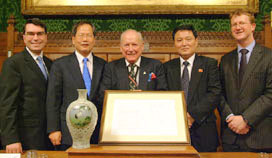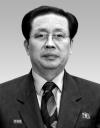UPDATE 2: Financial markets do not seem to care. According to Reuters:
Financial markets in Seoul and Tokyo were not affected by North Korea’s announcement, with investors seeing it as more of the sabre-rattling they have come to expect from Pyongyang.
UPDATE 1: According to the Wall Street Journal, the DPRK has ordered nuclear inspectors to leave the country (again):
North Korea ordered International Atomic Energy Agency inspectors out of the country Tuesday. The decision ends international monitoring of a research reactor at Yongbyon and in theory could allow reprocessing of fuel rods to produce plutonium. The IAEA is expected to announce the eviction in the next hour.
The on-again, off-again inspections at the 5-megawatt Experimental Nuclear Reactor Plant and the Nuclear Fuel Fabrication Plant at Yongbyon resumed in October, soon after the U.S. announced it would remove North Korea from the State Department list of countries that sponsor terrorism.
The IAEA issued a press statement here.
ORIGINAL POST:
The UN Security Council has published its presidential statement condemning th DPRK’s missile launch (read the full text of the statement here), and the media is widely reporting on the contents:
The United Nations Security Council has condemned North Korea’s April 5th rocket launch and demanded that Pyongyang not conduct further tests, saying that it would expand sanctions against North Korea.
—
The Security Council’s presidential statement is a level below a resolution — which has the power of force to back it up. But several ambassadors, including U.S. envoy Susan Rice, said the statement is legally binding, nonetheless. “The United States views presidential statements, broadly speaking, as binding. In this instance, it is more than binding in that it adds to an existing Chapter 7 sanctions regime. So in our view, there is no doubt that the measures that will be imposed as a consequence of this presidential statement by the 24th or 30th of April will occur and will be binding,” he said.
—
Monday’s statement goes further, saying there will be additional strengthening of measures in resolution 1718 and activates the dormant sanctions committee set up under that resolution.
“It is not extending the number of sanctions. It is not doing that. What it is doing is broadening the base of sanctions under the existing resolution. That is what we have agreed to do in principle and we have agreed to do it in a tight timeline by end of this month. So we are tightening the sanction screw a notch against North Korea,” said British Ambassador, John Sawers.
The statement calls for the designation of entities that would be subject to asset freezes and the prohibition of the transfer of some goods into or out of North Korea.
Turkish Ambassador Baki Ilkin, chairman of the sanction committee, said no countries have officially submitted their list yet. But several ambassadors said they are putting them together. (Voice of America)
This morning, the DPRK annonced it will withdrawl from 6 party talks:
Fuming at the U.N. Security Council for condemning its recent missile launch, North Korea said Tuesday it will restart its plutonium factory, junk all its disarmament agreements and “never participate” again in six-country nuclear negotiations.
It called the Security Council’s statement a “brigandish,” “wanton” and “unjust” infringement of its sovereignty. It said that six-party nuclear talks with the United States, South Korea, Japan, Russia and, even its closest ally, China, had “turned into a platform” for forcing the North to disarm itself and for bringing down its system of government.
“We have no choice but to further strengthen our nuclear deterrent to cope with additional military threats by hostile forces,” North Korea’s Foreign Ministry said in a statement released by its state news agency.
If it follows through on Tuesday’s bluster, North Korea will walk away from six years of slow, fitful but sometimes productive negotiations that have led to substantial disablement of the North’s main nuclear reactor and partial disclosure of the scale of its weapons program.
—
“We will actively consider building our own light-water nuclear reactor, will revive nuclear facilities and reprocess used nuclear fuel rods,” the ministry said. Experts have said the North does not have the equipment or skills to make an advanced light-water reactor.
China, host of the six-party talks, called for restraint and calm on Tuesday, asking all countries to return to the discussions, even after North Korea announced it would never do so.
“We hope the relevant parties could proceed from the perspective of the overall interest of the region, so as to work together to safeguard the progress of the six-party talks,” Chinese foreign ministry’s spokeswoman Jiang Yu said at a news briefing.
Japan also urged North Korea to return to the talks and the Russia government said it regretted Pyongyang’s decision.
—
Analysts in Seoul said that North Korea, with its threat to pull out of the six-party talks, appeared to be up to its familiar tactics of brinkmanship — creating a crisis in order to be rewarded for helping to solve it.
“North Korea can use today’s walkout as a negotiating chip with the United States in the future,” said Koh Yu-whan, a profession of North Korean studies at Dongguk University in Seoul.
“North Koreans have learned from past experience that when they create worst-case scenarios they get closer to solving their problems,” said Chun Hyun-joon, a North Korea specialist at the Korea Institute for National Unification. (Washington Post)
Here is the full KCNA comment:
DPRK Foreign Ministry Vehemently Refutes UNSC’s “Presidential Statement”
Pyongyang, April 14 (KCNA) — The DPRK Foreign Ministry issued a statement Tuesday flatly rejecting the brigandish “presidential statement” which the U.S. and its followers finally released by abusing the UNSC to condemn the DPRK’s launch of satellite for peaceful purposes.
Saying that throughout history the UNSC has never taken issue with satellite launches, the statement continues:
First, the DPRK resolutely rejects the unjust action taken by the UNSC wantonly infringing upon the sovereignty of the DPRK and seriously hurting the dignity of the Korean people.
Second, there would be no need to hold six-party talks which the DPRK has attended.
Now that the six-party talks have turned into a platform for infringing upon the sovereignty of the DPRK and seeking to force the DPRK to disarm itself and bring down the system in it the DPRK will never participate in the talks any longer nor it will be bound to any agreement of the six-party talks.
Third, the DPRK will bolster its nuclear deterrent for self-defence in every way.
It will take the measure for restoring to their original state the nuclear facilities which had been disabled under the agreement of the six-party talks and putting their operation on a normal track and fully reprocess the spent fuel rods churned out from the pilot atomic power plant as part of it.
Read the full stories here:
North Korea orders UN nuclear inspectors to leave
Reuters
Jon Herskovitz
4/14/2009
North Korea Expels Nuclear Inspectors After Leaving Six-Party Talks
Wall Street Journal
David Crawford, Evan Ramstad
4/14/2009
Security Council condemns DPR Korea’s recent launch
UN Security Council Press Release
4/13/2009
UN Condemns North Korea Rocket Launch
Voice of America
Margaret Besheer
4/13/2009
N. Korea Says It Will Boycott Nuclear Talks, Restart Weapons Plant
Washington Post
Blaine Harden
Washington Post Foreign Service
4/14/2009





 Jang Song-taek, Kim Jong il’s brother in law, and his senior aid were promoted to the DPRK’s top governing body the National Defense Commission
Jang Song-taek, Kim Jong il’s brother in law, and his senior aid were promoted to the DPRK’s top governing body the National Defense Commission